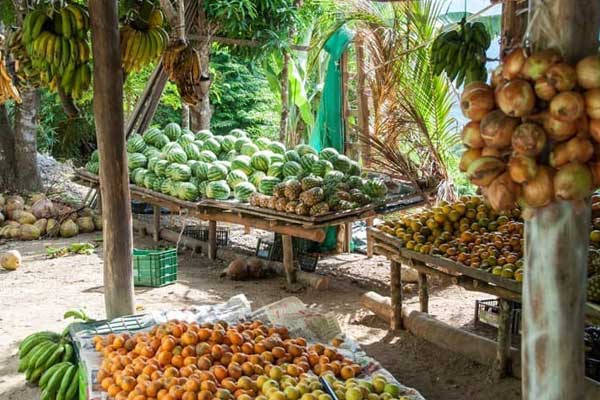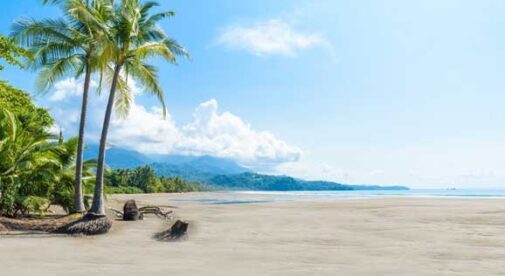“It’s a crazed, high-energy life in the U.S.,” David Bohn says, from the comfort of his Spanish Colonial-styled living room in the Southern Zone of Costa Rica. That’s not the case where David now resides. If Costa Rica is one of the world’s most relaxed countries, the Southern Zone is its version of Hawaii—the calm, unspoiled region that even Costa Ricans consider to be the go-slow center of low-stress living.
“Here, you can just take a deep breath. It’s calm. If you’ve heard of blue zones—where people typically live longer—Costa Rica is one of those. I think the relaxed way of life here contributes to longevity.”
It’s an important point, because although Costa Rica is beautiful, it takes more than a pretty view to make a happy home. David and his wife, Christine, learned that the hard way. They were successful in the U.S., with a home and business on Hilton Head Island in South Carolina. For a lot of people, that would be paradise enough. White sand, sea pines, a picturesque harbor watched over by an antique lighthouse. Why would anyone leave it?
Are you interested in retiring abroad? Yes | Not Sure Yet
Hilton Head Island certainly looks beautiful. But if the lifestyle you live is putting a strain on your health, it doesn’t matter how pretty it is.
“Christine has Parkinson’s Disease,” David explains. “This might not be the most scientific diagnosis in the world, but we can see that fresh air, good food, and a low-stress lifestyle helps with her condition. Costa Rica has all those things. Plus, it gets far too hot in South Carolina!”
That’s an interesting observation coming from a man who now lives in a tropical country, but as David points out, the extremes of seasonal temperature just don’t apply in the forested corner of Costa Rica’s Southern Zone where they live now.
“It’s pretty much 75 F to 85 F every day here. Wet season, dry season, that’s the only variation. In South Carolina it could get so much hotter than that in summer. I think the dependable, stable weather is one of the things that makes Costa Ricans so tranquil. I think it really contributes to that calm they have.”
David and Christine had been to Costa Rica on vacation numerous times before they moved there some seven years ago. Those trips, although they weren’t designed with it in mind, turned out to be invaluable research for their eventual relocation.

Get Your Free Costa Rica Report Here:
Learn more about Costa Rica and other countries in our daily postcard e-letter. Simply enter your email address below and we'll send you a FREE REPORT – Costa Rica: The Land of Pura Vida
This special guide covers real estate, retirement and more in Costa Rica and is yours free when you sign up for our IL postcards below.
“We live just below San Isidro del General, which is the capital of the Southern Zone. In fact, it used to be the capital of Costa Rica, before they moved that to San José. The area’s agricultural, not touristy at all. Lots of farms. We have an excellent farmers’ market here, which makes sense—we’re in the bread basket of Costa Rica. All the same, we’re only about 10 miles inland. We can be on Dominical beach in half an hour.”
Right now, David and Christine are renting their three-bedroom, two-bathroom, fully furnished house for $1,000 a month. “For $1,000 a month, you can find a really nice place. On the lower end, you can definitely go as low as $500, and if you want something palatial with its own pool and huge gardens, staff, etc., that obviously costs more, closer to $3,000 a month. We choose to rent right now because we like the freedom it gives us. We’re not tied to a property or a mortgage. It gives us the freedom to be able to move.”
Claiming Social Security in Costa Rica is seamless in these days of electronic transfers, and both David and Christine have been receiving theirs for years. “We could live here comfortably on what we get,” David says. “Living costs are low. Electricity can be a little expensive, which is surprising given that Costa Rica generates so much of its own power, but the rest of our amenities come out at $50 to $100 a month. Good internet costs about $50 a month, too.
“Groceries, though, cost next to nothing. I mean, despite one of us having a life-threatening condition, otherwise we have very little contact with the doctor at all. We take a holistic approach to Christine’s health, and that means lots of fresh fruit and vegetables. That’s a joy here, because anything you buy from the farmers’ market was still in the ground or on the tree just days before you eat it. And it’s such good produce. We grow a few herbs, some flowers, but there’s simply no need to grow your own food here to guarantee quality. Those guys grow it far better than we can.”

Is that enough to combat a case of Parkinson’s? “Not on its own, no, but the whole way of life we have here helps immensely.”
Of course, Christine needs conventional treatments from time to time, alongside the natural healing approach. “We make use of the CAJA system here. It’s our first experience of socialized healthcare and it was a very pleasant surprise. It’s really impressive to see how well it works. Even away from the hospitals, every little town has a little clinic. They take really good care of you.”
Other than that, life just rolls along for David and Christine. It has a tendency to do just that when you can depend on warm days, good food, and chilled-out people to mix with.
“On a typical day, I might go hang out with my gringo friends in the neighborhood,” says David, “but yesterday we had a new experience when we got invited to a Costa Rican birthday party for a seven-year-old. It was great fun. It made me want to brush up my Spanish though. I was struggling a little.
“I’d advise anyone coming here to try to learn some of the language. Not so that you can get by—you can get by in English, no real problem there—but the locals absolutely love it if you try to speak Spanish with them. They see it as a mark of respect, and once you show that, they’ll welcome you into their lives and community. It’s a beautiful thing.”

Get Your Free Costa Rica Report Here:
Learn more about Costa Rica and other countries in our daily postcard e-letter. Simply enter your email address below and we'll send you a FREE REPORT – Costa Rica: The Land of Pura Vida
This special guide covers real estate, retirement and more in Costa Rica and is yours free when you sign up for our IL postcards below.
Related Articles
Best Places to Live in Costa Rica: Five Top Expat Havens
Is it Safe to Live in Costa Rica?
An Overview of Traditions and Culture in Costa Rica
Upcoming Conferences
The Only 2024 Fast Track Panama Conference
If your dream retirement involves stunning beaches… lush green mountains… a warm climate with no hurricanes… first-rate healthcare… incredible value for money (a couple can live well on $2,200 a month)… and the World’s #1 Retiree Discount Program…
Join our Panama experts and expats in February and discover why Panama could be your perfect paradise.
REGISTER NOW, SEATS LIMITED: EARLY BIRD DISCOUNT HERE


.png)